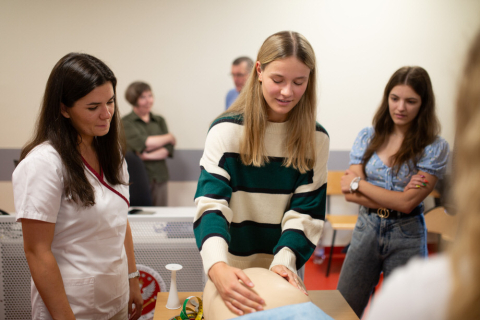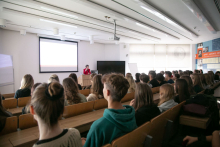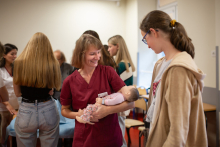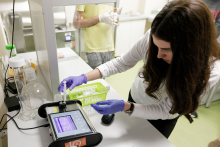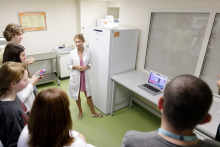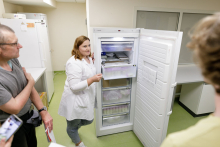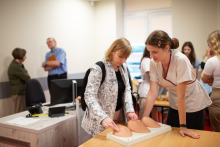program was divided into three parts: classes, meetings, and exhibitions. Some of the two former options were delivered on-line. Our experts and students took the festival participants to the fascinating world of biology and medicine.
Lectures and workshops
Barbara Mazurkiewicz, MD, from the Gynecology & Obstetrics Teaching Department, together with members of the Students’ Ethics Group (at the Gynecology & Obstetrics Teaching Department) prepared a workshop entitled Be a grandpa/grandma who’s not a boomer! We welcome our grandchildren to the world. She talked about the changes that occurred in perinatal care throughout several dozen years, and about the latest infant care recommendations. There was also a training session in communication, with tips on how to talk to young parents to make them willing to listen.
The workshop dedicated to Breast Milk Banks and the importance of breastfeeding was highly popular. It was prepared by Agnieszka Bzikowska-Jura from the Department of Medical Biology. Class participants were given an opportunity to see the milk flow at a milk bank and to learn about the latest developments in breastfeeding science, e.g. that the mother’s milk composition may vary according to the child’s individual needs.
Another interesting session was prepared by Grażyna Bączek, PhD hab., from the Gynecology & Obstetrics Teaching Department. This workshop was organized with the support of members of the Students’ Obstetrician Study Group. It was an interactive session with the use of models, phantoms, photos, a multimedia presentation. Subject: From conception to birth - helping a human being come to the world.
In a series of weekend meetings, there was an opportunity to meet Anna Henriques de Sepulveda, PhD hab., from the Biophysics, Physiology and Pathophysiology Department. Our expert spoke about the blood-brain barrier and its importance for the nervous system and the immune system. She also presented the findings of her own research on the neuroprotective impact of selected dietary supplements.
Classes for youth
Grażyna Bączek, PhD hab., taught a biology class for high school. Subject: Human growth and birth, a unique process designed by nature. Our expert spoke about the stages of the conception process, intrauterine development and birth of a human being. Not only from the perspective of biology and physiology, but also in psychological and sociological terms.
Another biology class for high schools was prepared by Sylwia Jarzynka, PhD, together with Anna Minkiewicz-Zochniak, PhD, both from the Medical Biology Department, in collaboration with the “Agar” Students’ Study Group. “Our invisible enemies and friends” was the title of the class where the participants could observe the bacteria and fungi that inhabit the human body and the environment under a microscope.
There was a meeting for elementary school grades 7-8 students with Lucyna Kwiećkowska, PhD, from the Fundamentals of Nursing Department. Subject: How can you save somebody’s life? The topics covered included first aid, blood donation, consent to post mortem tissue and organ procurement for transplantation.
Can you get diabetes from eating candy – this class was also targeted at students of the highest grades of elementary school. It was taught by Iwona Kiersnowska, PhD, from the Fundamentals of Nursing Department, in collaboration with “StatMed” Students’ Study Group. Young learners found out how blood sugar levels are regulated and what happens when they are too high. They also had the opportunity to measure their own glucose levels.
The 27th Warsaw Science Festival took place from September 15 to September 29. It encompassed more than 350 meetings with experts in various areas of science. The event was attended by researchers from the Faculty of Health Sciences at the WUM Medical University of Warsaw. Małgorzata Witkowska-Zimny, PhD hab., was the Festival Coordinator at the Faculty of Health Sciences.
